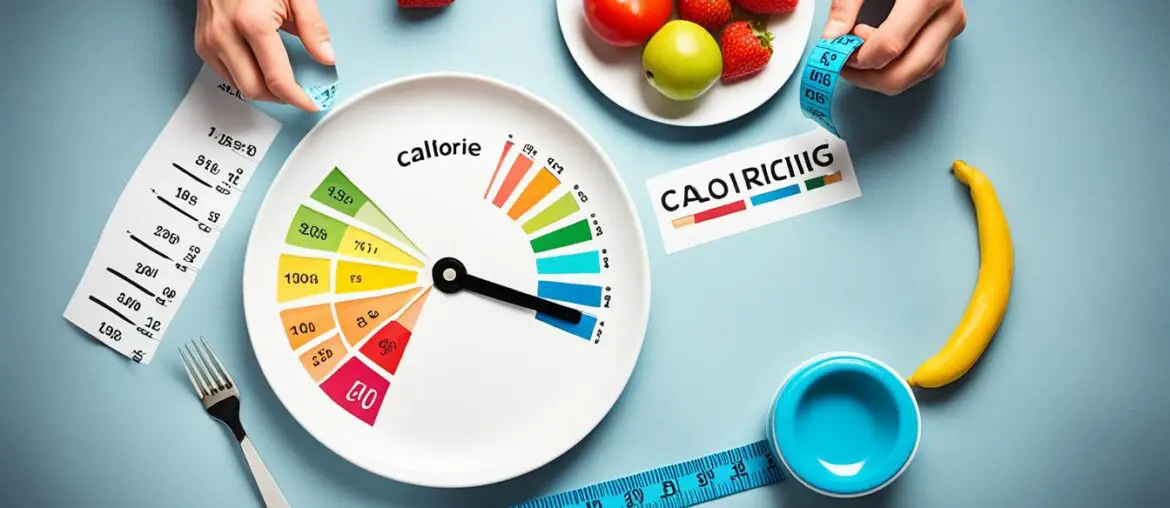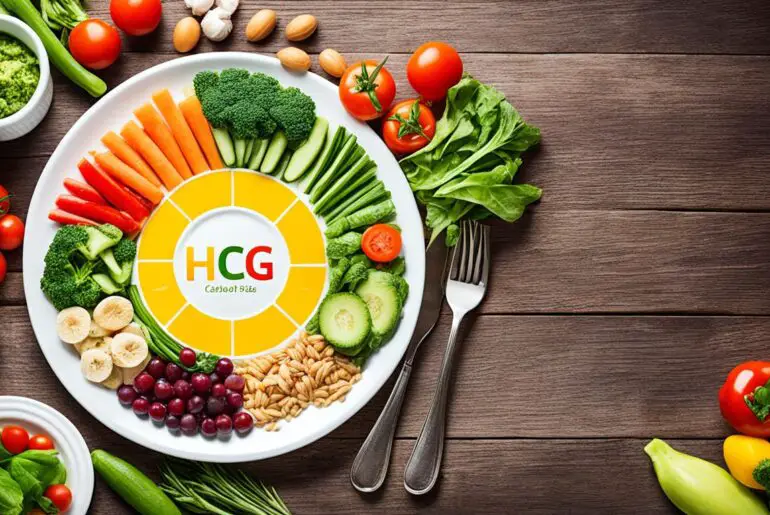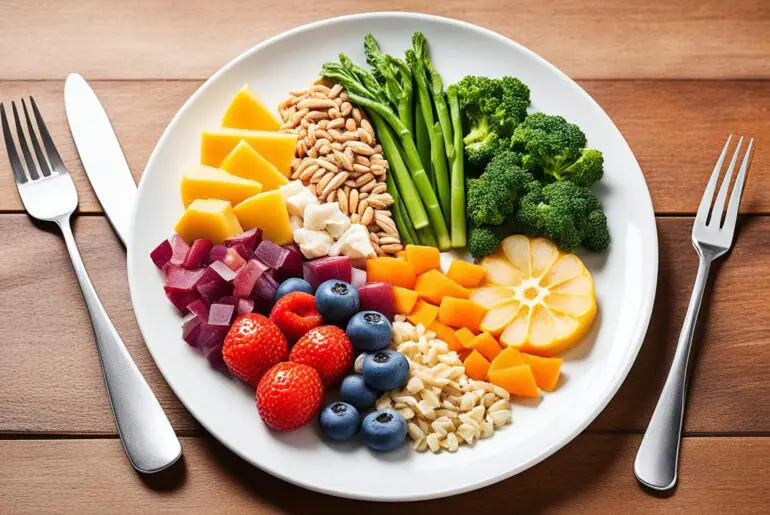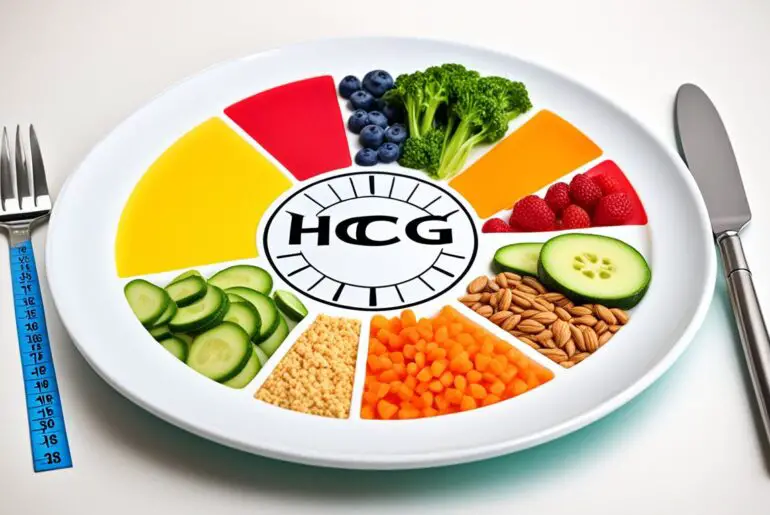Are you tired of trying countless diets with little success? Have you heard about the HCG diet and its promise of rapid weight loss? But here’s the burning question – what are the calorie limits on the HCG diet, and are they really effective?
The HCG diet has gained popularity for its extreme calorie restrictions, ranging from 500 to 800 calories per day. Proponents claim that this low-calorie intake, alongside HCG injections, can lead to significant weight loss by targeting stored body fat. But is this really the secret to shedding unwanted pounds, or is there more to the story?
In this article, I will dive deep into the calorie limits on the HCG diet, uncovering the truth behind this controversial weight loss method. We’ll explore its origins, evaluate its safety, examine the allowed foods, discuss its effectiveness, and highlight potential risks. By the end, you’ll have a clear understanding of whether the HCG diet is worth your time and effort.
Key Takeaways:
- The HCG diet involves severe calorie restrictions, typically ranging from 500 to 800 calories per day.
- There is no scientific evidence to support the efficacy of the HCG diet for weight loss.
- The HCG diet can lead to nutrient deficiencies and other health risks.
- Registered dietitians and healthcare professionals advise seeking safer alternatives for weight loss.
- Long-term sustainable approaches to weight loss, such as balanced eating and regular exercise, are recommended for optimal results.
The Origins of the HCG Diet
In the early 1950s, a British physician named Albert Simeons introduced the HCG diet. Simeons claimed that this diet could enable participants to burn stored body fat and achieve rapid weight loss without experiencing hunger or weakness.
However, it is important to note that there is no scientific evidence to support these claims, and the U.S. Food and Drug Administration (FDA) has not approved the use of HCG for weight loss. Despite the lack of scientific backing, the HCG diet gained popularity due to the promise of quick results.
The HCG diet is characterized by severe calorie restriction, typically ranging from 500 to 800 calories per day. Additionally, the diet involves the use of supplemental HCG injections. The objective is to trigger the body to utilize stored fat for energy and promote weight loss.
“The HCG diet allowed participants to burn stored body fat and achieve rapid weight loss without feeling hungry or weak.”
While Simeons’ claims suggested that the HCG diet was a revolutionary approach to weight loss, it is crucial to emphasize that there is no scientific evidence supporting its effectiveness. Furthermore, healthcare professionals express concerns about the potential risks and adverse effects associated with severe calorie restriction.
Before proceeding further, let’s take a closer look at the calorie restrictions, protocol, and guidelines typically followed on the HCG diet:
Calorie Restrictions: The HCG diet involves severe calorie restriction, typically ranging from 500 to 800 calories per day. This extreme reduction in calorie intake intends to force the body to utilize stored fat for energy.
HCG Protocol: The HCG diet protocol includes the administration of supplemental HCG through injections. The injections are typically administered daily or multiple times per week, depending on the specific guidelines followed by participants.
HCG Diet Calorie Guidelines: The HCG diet strictly limits the types of foods that can be consumed. The focus is on lean proteins, non-starchy vegetables, and limited fruits. The diet restricts or eliminates certain food groups, such as dairy, grains, oils, and high-carb foods.
To provide a visual representation, the following table outlines the typical daily calorie breakdown and an example of a meal plan on the HCG diet:
| Meal | Calories |
|---|---|
| Breakfast | 100-150 calories |
| Lunch | 100-150 calories |
| Dinner | 200-250 calories |
| Snack | 50-100 calories (optional) |
While this extreme calorie restriction may facilitate short-term weight loss, there are concerns regarding its sustainability and potential negative effects on overall health. Additionally, the lack of scientific evidence supporting the HCG diet raises doubts about its long-term effectiveness and safety.
Is the HCG Diet Safe?
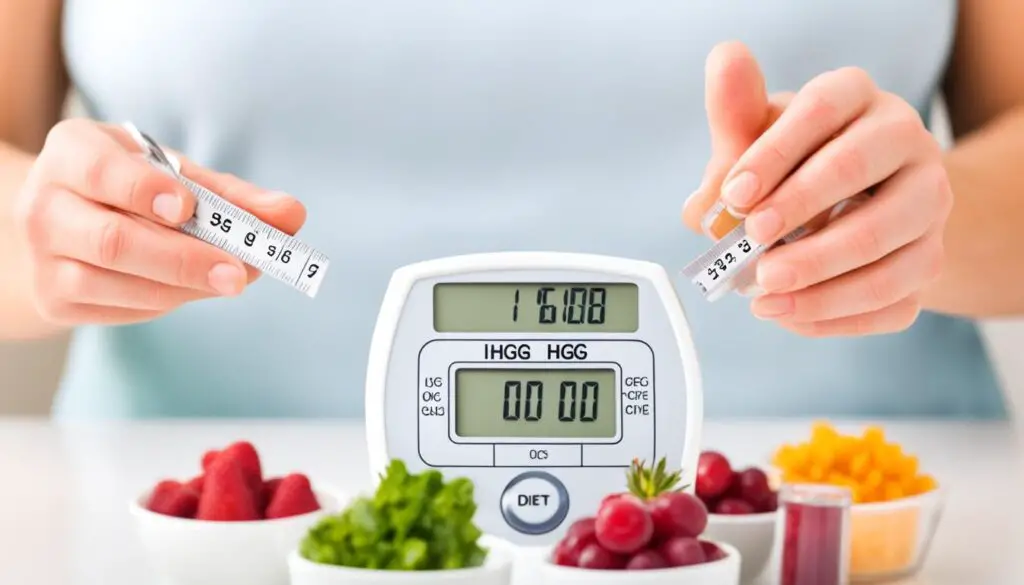
The safety of the HCG diet is a major concern among health experts. The FDA has not approved the use of HCG for weight loss, and there is no scientific evidence to support its efficacy. The diet involves severe calorie restriction, which poses risks to overall health and well-being. One of the primary concerns is the potential for nutrient deficiencies due to the limited food choices on the diet.
Registered dietitians express extreme concern regarding the HCG diet’s impact on nutrient intake. The severe calorie restriction combined with the restricted food options can lead to imbalances and deficiencies in important vitamins, minerals, and macronutrients. These deficiencies can have a detrimental effect on overall health and may contribute to various health issues.
Moreover, the risks associated with the HCG diet extend beyond the short-term. The potential for nutrient deficiencies, coupled with the extreme calorie restriction, can lead to long-term health complications. Research suggests that individuals who follow such low-calorie diets may be at a higher risk of developing diseases like cancer, diabetes, and heart disease.
Risks of the HCG Diet
Here are some of the potential risks and concerns associated with the HCG diet:
- Severe calorie restriction can lead to fatigue, weakness, and dizziness.
- Nutrient deficiencies can cause various health problems and hinder proper bodily functions.
- Constipation and other digestive issues may arise due to the limited intake of fiber-rich foods.
- The diet’s restrictive nature can negatively impact a person’s relationship with food, leading to disordered eating behaviors.
- HCG injections can result in pain, bruising, infection, and allergic reactions.
- Weight regain is a common concern once the diet is discontinued, as the severe calorie restriction is not sustainable.
“The HCG diet is not considered safe by health experts. The severe calorie restriction and limited food choices can lead to nutrient deficiencies, potential health risks, and an unhealthy relationship with food.”
It is crucial to prioritize one’s health and well-being when considering any weight loss plan. Instead of resorting to potentially unsafe methods like the HCG diet, individuals are advised to explore safer and more sustainable alternatives that are backed by scientific evidence.
Remember, a balanced and personalized approach to weight loss, focusing on overall healthy eating patterns, regular physical activity, and guidance from healthcare professionals or registered dietitians, is key to achieving long-term success.
| Risks of the HCG Diet | Why it’s a concern |
|---|---|
| Severe calorie restriction | Potential for fatigue, weakness, and dizziness |
| Nutrient deficiencies | Can lead to health problems and hinder bodily functions |
| Disordered eating behaviors | The restrictive nature of the diet can negatively impact the relationship with food |
| HCG injections | Possible pain, bruising, infection, and allergic reactions |
| Weight regain | Common once the severe calorie restriction is discontinued |
It is evident that the risks associated with the HCG diet outweigh any potential benefits. Prioritizing one’s health and working with qualified professionals to develop a personalized weight loss plan can help ensure long-term success while minimizing the potential for complications. Making sustainable lifestyle changes and focusing on overall well-being is always the best approach for achieving and maintaining a healthy weight.
The Food Allowed on the HCG Diet
When following the HCG diet, there is a list of recommended foods that you can consume. It is important to note that this list is subjective and not supported by scientific evidence. However, it can serve as a general guideline for planning your meals.
The HCG diet primarily focuses on lean proteins, non-starchy vegetables, and limited fruits. Here is a breakdown of the foods typically allowed on the HCG diet:
Lean Proteins:
- Chicken breast
- Turkey breast
- White fish (such as cod or halibut)
Non-Starchy Vegetables:
- Spinach
- Cauliflower
- Zucchini
Limited Fruits:
- Berries (such as strawberries, blueberries, or raspberries)
- Citrus fruits (such as oranges or grapefruits)
It is important to note that the HCG diet restricts certain foods such as dairy, grains, oils, and high-carb foods. Coffee and tea are allowed, but only sweetened with stevia or saccharin.
Portion control and low-calorie meals are emphasized on the HCG diet. It is crucial to consult with a healthcare professional or registered dietitian to ensure that you are meeting your nutritional needs while on this diet.
Remember, the HCG diet is not approved by the FDA, and its safety and effectiveness are not supported by scientific evidence. It is always recommended to choose safer alternatives for weight loss that focus on balanced eating and regular exercise.
The Effectiveness of the HCG Diet

When it comes to weight loss, many individuals are searching for the most effective and efficient methods to achieve their goals. One popular diet that has gained attention in recent years is the HCG diet. But does the HCG diet actually work?
Unfortunately, there is no scientific evidence to support the effectiveness of the HCG diet for weight loss. Multiple studies have shown that any weight loss achieved on the diet is primarily due to the severe calorie restriction it entails, rather than the HCG hormone itself. In fact, a 2016 article published in the Journal of Dietary Supplements explicitly stated that there is no science available to support the efficacy of the HCG diet.
Registered dietitians are unanimous in their agreement that the HCG diet is not only ineffective but also dangerous. The severe calorie restriction and limited food choices on the diet can lead to nutrient deficiencies, fatigue, and even the development of unhealthy eating behaviors. It is essential to prioritize long-term health and sustainable weight loss methods rather than relying on quick-fix diets with potential risks.
“There is no scientific evidence to support the effectiveness of the HCG diet. The severe calorie restriction it involves is the primary cause of weight loss, not the HCG hormone itself.”
Given the lack of scientific backing and the potential risks associated with the HCG diet, it is highly recommended to explore safer alternatives for weight loss. These alternatives include adopting a balanced eating plan, engaging in regular exercise, and working with a healthcare professional or registered dietitian to create a personalized weight loss strategy. These approaches focus on long-term lifestyle changes and overall well-being, ensuring a healthier and more sustainable weight loss journey.
Comparison of HCG Diet and Safer Weight Loss Alternatives
| HCG Diet | Safer Weight Loss Alternatives | |
|---|---|---|
| Efficacy for Weight Loss | No scientific evidence | Backed by scientific research |
| Nutrient Deficiencies | Potential due to limited food choices | Emphasizes a balanced diet |
| Long-Term Sustainability | Not sustainable | Promotes healthy habits for sustainable weight management |
| Risks and Side Effects | Potential for adverse effects, including fatigue, nutrient deficiencies, and unhealthy eating behaviors | Focuses on overall well-being with minimal risks |
It is crucial to prioritize your health and well-being when considering weight loss methods. Instead of resorting to the HCG diet, opt for safer alternatives that have been proven effective and sustainable. Remember, achieving and maintaining a healthy weight is a journey that should prioritize your long-term health and happiness.
Potential Risks of the HCG Diet
The HCG diet is associated with various risks and side effects. The severe calorie restriction can lead to fatigue, irritability, depression, nutrient deficiencies, constipation, dry skin, hair loss, and weight regain. This extreme calorie restriction may result in a lack of essential nutrients, which can negatively impact overall health.
Serious adverse reactions have also been reported, including cases of pulmonary embolism, depression, cerebrovascular issues, cardiac arrest, and even death. These risks highlight the potential dangers of the HCG diet and the importance of considering alternative weight loss methods.
“The severe calorie restriction and limited food choices on the HCG diet may cause nutrient deficiencies, which can have adverse effects on physical and mental well-being.”
HCG injections, a key component of the diet, can cause pain, bruising, infection, and allergic reactions. The use of these injections should be carefully considered, especially in individuals with a history of sensitivity or allergic reactions.
Furthermore, following the HCG diet can lead to the development of disordered eating behaviors and an unhealthy relationship with food. The extreme restriction and focus on weight loss can contribute to mental health issues, including anxiety and obsessive thoughts about food.
It is crucial to understand the potential risks and side effects of the HCG diet before considering it as a weight loss option. Consulting with a healthcare professional or registered dietitian is recommended to explore safer alternatives that prioritize long-term health and sustainable weight loss.
Safer Alternatives for Weight Loss

As a healthcare professional, I strongly advise against the use of the HCG diet for weight loss. Thankfully, there are safer alternatives available that have been supported by scientific evidence and promote healthier, sustainable weight loss.
One of the most effective alternatives is adopting a balanced and nutritious diet. By eating a variety of whole foods, including lean proteins, fruits, vegetables, whole grains, and healthy fats, you can provide your body with the essential nutrients it needs for optimal health and weight management.
In addition to a healthy diet, regular physical activity is crucial for weight loss. Engaging in activities that you enjoy, such as brisk walking, cycling, or swimming, can help burn calories, build muscle, and improve overall fitness. Aim for at least 150 minutes of moderate-intensity aerobic exercise per week, along with strength training exercises two days a week.
To maximize your weight loss efforts and ensure they align with your specific needs and goals, I recommend consulting with a healthcare professional or registered dietitian. They can assess your current health status, provide personalized guidance, and create a tailored weight loss plan that takes into account your individual needs and preferences.
Remember, lasting weight loss is not about quick-fix diets or restrictive eating plans. It’s about making sustainable lifestyle changes that promote overall well-being. By focusing on a balanced diet, regular exercise, and personalized support, you can achieve healthier weight loss and maintain it in the long run.
Let’s prioritize our health and well-being by opting for safe and effective weight loss strategies.
| Safe Alternatives | Description |
|---|---|
| Eat a Balanced Diet | Focus on consuming a variety of nutrient-dense foods, including lean proteins, fruits, vegetables, whole grains, and healthy fats. |
| Engage in Regular Exercise | Include both cardio and strength training exercises in your routine to burn calories, increase muscle tone, and improve overall fitness. |
| Work with a Healthcare Professional or Registered Dietitian | Receive personalized guidance and support to develop a customized weight loss plan that aligns with your specific needs and goals. |
| Focus on Sustainable Lifestyle Changes | Avoid quick-fix diets and instead prioritize long-term, healthy habits that can be maintained for a lifetime. |
The Role of Calorie Intake in Weight Loss

When it comes to weight loss, many people believe that reducing calorie intake is the key to success. While it is true that lowering calorie intake can result in short-term weight loss, it may not be sustainable in the long term. This is because low-calorie diets can have adverse effects on metabolism and hormone levels.
Studies have shown that when the body is consistently exposed to calorie restriction, it responds by slowing down metabolism. This means that the body becomes more efficient at utilizing the calories it receives, making weight loss more challenging over time. Additionally, calorie restriction can impact hormone levels, such as leptin, ghrelin, and thyroid hormones, which play a crucial role in regulating appetite and metabolism.
Researchers are calling for more studies to explore alternative mechanisms for long-term weight control that go beyond calorie restriction. It is important to understand that weight loss is a complex process influenced by various factors, including genetics, lifestyle, and overall health. Focusing solely on calorie counting may not provide a sustainable solution for achieving and maintaining a healthy weight.
To effectively manage weight, individuals should focus on adopting overall healthy eating patterns and making lifestyle changes. This includes consuming a balanced diet that is rich in nutrient-dense foods, being physically active, managing stress levels, and getting enough quality sleep. By incorporating these habits into daily life, individuals can achieve a healthier weight and improve their overall well-being.
Remember, sustainable weight loss is not about extreme restriction or quick fixes. It is a gradual, long-term journey that requires a holistic approach to achieve lasting results.
| Pros of Calorie Intake | Cons of Calorie Intake |
|---|---|
| * Can result in short-term weight loss | * Can slow down metabolism |
| * May lead to improved insulin sensitivity | * Can have unfavorable effects on hormones |
| * Helps create a calorie deficit for weight loss | * May increase hunger and cravings |
| * Can be a tool for portion control | * May lead to nutrient deficiencies if not done properly |
Conclusion
In conclusion, the HCG diet is not recommended by healthcare professionals due to the lack of scientific evidence supporting its efficacy and the potential risks associated with it. The severe calorie restriction and limited food choices on the diet can lead to nutrient deficiencies and unhealthy eating behaviors. It is important to prioritize long-term, sustainable approaches to weight loss that focus on balanced eating, regular exercise, and personalized weight loss plans created with the guidance of a healthcare professional or registered dietitian.
Instead of relying on quick-fix diets like the HCG diet, it is beneficial to adopt a holistic approach to weight loss, considering overall lifestyle changes and healthy habits. By focusing on balanced eating, incorporating regular physical activity, and seeking professional guidance, individuals can achieve their weight loss goals in a safe and sustainable manner.
In essence, it is crucial to prioritize one’s health and well-being when embarking on a weight loss journey. The HCG diet offers no proven benefits and poses potential risks that outweigh any potential short-term weight loss. By choosing safer alternatives and working with healthcare professionals, individuals can achieve long-lasting results and maintain a healthy weight for the future.
FAQ
What is the HCG diet?
The HCG diet is a very low-calorie diet that typically ranges from 500 to 800 calories per day. It is often used in conjunction with supplemental HCG injections and claims to stimulate weight loss by burning stored body fat.
Is the HCG diet safe?
No, the HCG diet is not considered safe by health experts. The FDA has not approved the use of HCG for weight loss, and there is no scientific evidence to support its efficacy. The severe calorie restriction and limited food choices on the diet can lead to nutrient deficiencies and other health risks.
What foods are allowed on the HCG diet?
The HCG diet generally allows lean proteins like chicken, turkey, and white fish, as well as non-starchy vegetables such as spinach, cauliflower, and zucchini. Limited fruits like berries and citrus fruits are also permitted. The diet restricts foods like dairy, grains, oils, and high-carb foods.
Is the HCG diet effective for weight loss?
No, there is no scientific evidence to support the effectiveness of the HCG diet for weight loss. Any weight loss achieved on the diet is due to severe calorie restriction, not the HCG hormone itself.
What are the potential risks of the HCG diet?
The HCG diet is associated with various risks and side effects. These can include fatigue, irritability, depression, nutrient deficiencies, constipation, dry skin, hair loss, weight regain, and even serious adverse reactions like pulmonary embolism, depression, and cardiac arrest.
Are there safer alternatives for weight loss?
Yes, there are many safer alternatives for weight loss. These include eating a balanced diet, exercising regularly, and working with a healthcare professional or registered dietitian to create a personalized weight loss plan.
What role does calorie intake play in weight loss?
Lowering calorie intake can result in short-term weight loss, but it may not be sustainable in the long term. Low-calorie diets can slow down metabolism and have unfavorable effects on hormones. It is important to focus on overall healthy eating patterns and lifestyle changes rather than solely relying on calorie counting for weight loss.
Conclusion on the HCG diet?
The HCG diet is not recommended by health care professionals due to its lack of scientific evidence, potential risks, and potential for adverse effects. It is important to focus on long-term, sustainable approaches to weight loss rather than relying on quick-fix diets with potential risks.

